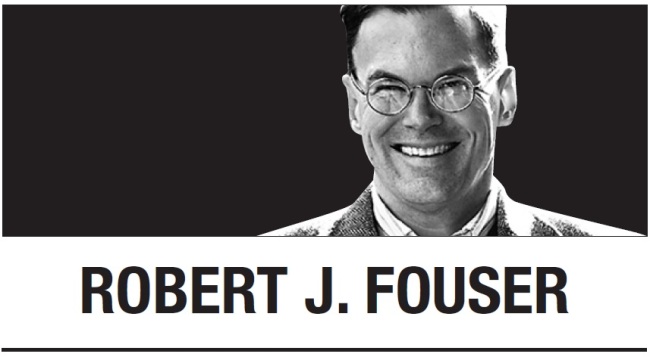[Robert J Fouser] Korea needs parliamentary system
By Korea HeraldPublished : March 27, 2018 - 17:37
 Last week, South Koreans saw the arrest of yet another former president as Lee Myung-bak was taken to jail on charges of graft. Lee won a landslide victory in December 2007 and served as president from 2008 to 2013. In the 1990s, Chun Doo-hwan and Roh Tae-woo were jailed, and Park Geun-hye was jailed shortly after being removed from power a year ago.
Last week, South Koreans saw the arrest of yet another former president as Lee Myung-bak was taken to jail on charges of graft. Lee won a landslide victory in December 2007 and served as president from 2008 to 2013. In the 1990s, Chun Doo-hwan and Roh Tae-woo were jailed, and Park Geun-hye was jailed shortly after being removed from power a year ago.To date, no Korean president has left office without controversy. Before the restoration of democracy in 1987, presidents left office either through resignation or assassination. In addition to the four former presidents since 1987 that have been jailed, sons of former presidents Kim Young-sam and Kim Dae-jung were jailed for influence peddling. Former President Roh Moo-hyun was questioned by the prosecution, but took his life before the investigation ended.
Koreans rightly bemoan this unfortunate track record and wonder what can be done to end what has become a curse on the presidency. The first step toward finding a solution is to find the root of the problem.
The most common explanation is the “imperial presidency theory.” This theory holds that the concentration of power in the presidential office creates opportunities for the abuse of power. The concentration of power gives the president wide influence over policy, which causes people to try to influence the president to their favor. The president, in turn, feels invincible and succumbs to temptation. This is a classic case of power corrupts.
Another explanation is the “political development theory.” This theory argues that Korea is a young democracy and that it will take time to develop a mature political culture. As generations that grew up after democratization enter leadership positions, the situation will improve. Voters, too, will demand greater accountability from politicians.
Last week, President Moon Jae-in proposed several revisions to the Constitution in the hope of reducing the powers of the president. The main proposal is to reduce the president’s term to four years with one chance at re-election. This may pressure presidents not to abuse their power during the first four years, but it does nothing to prevent problems from arising in a second term. The proposals do little to strengthen the power of the National Assembly or the judiciary.
President Moon’s proposals suggest he has greater faith in the “political development theory” because they do little to reduce the powers of the presidency. As democratization took hold and Korea joined the ranks of advanced nations, corruption in public life has waned. Greater openness and an aggressive media will continue to help keep politicians in check, ensuring continued political development.
The problem with the political development theory is that it overlooks structural problems in not just the Korean presidency, but in the presidential system itself. Among advanced democracies of the world, South Korea and the US are the only nations with a strong presidential system. France has a semipresidential system in which the president shares power with a strong prime minister. Most other advanced democracies have a parliamentary system in which an elected parliament chooses a prime minister and cabinet.
The essential problem with presidential systems is that they concentrate too much power in an executive who is difficult to remove. Most presidential systems allow for impeachment and removal from office, but the process creates turmoil and stirs up political passions. The difficulty of removing the president makes it harder to hold a president accountable. The possibility of re-election increases accountability, but term limits negate it. Not having term limits raises the risk of a president entrenching him or herself in power.
The advantage of a parliamentary system is accountability. The prime minister can be removed quickly through pressure to resign or a vote of no confidence in parliament, which requires a new election. A popular prime minister may stay in office for a long time, but is always accountable to the parliament and therefore the people.
Polls show that support for a parliamentary system is low in Korea. This is a pity because it increases accountability, which is the greatest weakness of the presidential system. History has not been kind to the yearlong experiment with a parliamentary system following the April Revolution of 1960. Most Koreans only know the presidential system, and so have difficulty imagining how government would work under a parliamentary system.
Now that President Moon has put constitutional reform on the table, supporters of the parliamentary system need to make their case that the only way to end the “imperial presidency” is to dispense with the inherently flawed presidential system itself.
Robert J. Fouser
Robert J. Fouser, a former associate professor of Korean-language education at Seoul National University, writes on Korea from Pawtucket, Rhode Island. He can be reached at robertjfouser@gmail.com. -- Ed.
-
Articles by Korea Herald

















![[KH Explains] Hyundai's full hybrid edge to pay off amid slow transition to pure EVs](http://res.heraldm.com/phpwas/restmb_idxmake.php?idx=652&simg=/content/image/2024/04/18/20240418050645_0.jpg&u=20240418181020)

![[Today’s K-pop] Zico drops snippet of collaboration with Jennie](http://res.heraldm.com/phpwas/restmb_idxmake.php?idx=642&simg=/content/image/2024/04/18/20240418050702_0.jpg&u=)